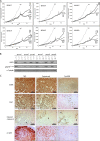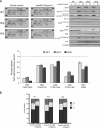Aan dit artikel is enkele uren gewerkt. Opzoeken, vertalen, plaatsen enz. Als u ons wilt ondersteunen dan kan dat via een al of niet anonieme donatie. Elk bedrag is welkom hoe klein ook. Klik hier als u ons wilt helpen kanker-actueel online te houden Wij zijn een ANBI organisatie en dus is uw donatie aftrekbaar voor de belasting.
11 augustus 2018: Zie ook dit artikel:
En in gerelateerde artikelen.
25 mei 2015: Lees ook eens dit artikel:
25 mei 2015: Bron: Cancer Discovery:
Studieresultaten:
17 van de 39 patiënten (44%) had een vermindering van de tumoromvang en aantal, bij 5 patiënten (13%) werd een gedeeltelijke remissie (= 50% of meer vermindering van tumoromvang en aantal) gezien. Bedenk daarbij dat al deze patiënten in de terminale fase verkeerden en allemaal zijn ze zwaar voorbehandeld. Dit is echter ook nog maar een fase I doserings en veiligheids studie en er zullen nog meer en grotere gerandomiseerde studies moeten volgen voordat deze medicijnen cocktail beschikbaar komt.
Wat ik me dan steeds weer opnieuw afvraag is waarom niet een fase II studie op te zetten met darmkankerpatiënten in een eerdere fase waarin deze patiënten lichamelijk een geestelijk nog in goede conditie zijn. Waarom altijd maar weer gewacht tot de patiënten lichamelijk volledig zijn afgebroken. Ik weet wel dat de richtlijnen en eisen voor gerandomiseerd onderzoek te stellen maar in dit tijdperk van personalised medicine moet het toch mogelijk zijn om al eerder gedegen gerandomiseerd onderzoek op te zetten?
Het volledige studierapport: Safety and Activity of the First-in-Class Sym004 Anti-EGFR Antibody Mixture in Patients with Refractory Colorectal Cancer is gratis in te zien of te downloaden in een PDF file.
Hier het abstract:
Potent EGFR downmodulation with Sym004 in patients with metastatic colorectal cancer and acquired resistance to cetuximab/panitumumab translates into significant antitumor activity and validates the preclinical hypothesis that a proportion of tumors remains dependent on EGFR signaling.
Safety and Activity of the First-in-Class Sym004 Anti-EGFR Antibody Mixture in Patients with Refractory Colorectal Cancer
- Rodrigo Dienstmann1,2,
- Amita Patnaik3,
- Rocio Garcia-Carbonero4,
- Andrés Cervantes5,
- Marta Benavent4,
- Susana Roselló5,
- Bastiaan B.J. Tops6,
- Rachel S. van der Post6,
- Guillem Argilés1,
- Niels J.Ø. Skartved7,
- Ulla H. Hansen7,
- Rikke Hald7,
- Mikkel W. Pedersen7,
- Michael Kragh7,
- Ivan D. Horak7,
- Stephan Braun7,
- Eric Van Cutsem8,
- Anthony W. Tolcher3 and
- Josep Tabernero1,*
+ Author Affiliations
- ↵*Corresponding Author:
Josep Tabernero, Vall d'Hebron University Hospital, Vall d'Hebron Institute of Oncology (VHIO), Universitat Autònoma de Barcelona, P. Vall d'Hebron 119-129, 08035 Barcelona, Spain. Phone: 34-93-489-4301; Fax: 34-93-274-6059; E-mail: jtabernero@vhio.net
Abstract
Tumor growth in the context of EGFR inhibitor resistance may remain EGFR-dependent and is mediated by mechanisms including compensatory ligand upregulation and de novo gene alterations. Sym004 is a two-antibody mixture targeting nonoverlapping EGFR epitopes. In preclinical models, Sym004 causes significant EGFR internalization and degradation, which translates into superior growth inhibition in the presence of ligands. In this phase I trial, we observed grade 3 skin toxicity and hypomagnesemia as mechanism-based dose-limiting events during dose escalation. In dose-expansion cohorts of 9 and 12 mg/kg of Sym004 weekly, patients with metastatic colorectal cancer and acquired EGFR inhibitor resistance were enrolled; 17 of 39 patients (44%) had tumor shrinkage, with 5 patients (13%) achieving partial response. Pharmacodynamic studies confirmed marked Sym004-induced EGFR downmodulation. MET gene amplification emerged in 1 patient during Sym004 treatment, and a partial response was seen in a patient with EGFRS492R mutation that is predictive of cetuximab resistance.
SIGNIFICANCE: Potent EGFR downmodulation with Sym004 in patients with metastatic colorectal cancer and acquired resistance to cetuximab/panitumumab translates into significant antitumor activity and validates the preclinical hypothesis that a proportion of tumors remains dependent on EGFR signaling. Further clinical development and expanded correlative analyses of response patterns with secondary RAS/EGFR mutations are warranted. Cancer Discov; 5(6); 1–12. ©2015 AACR.
Footnotes
-
Note: Supplementary data for this article are available at Cancer Discovery Online (http://cancerdiscovery.aacrjournals.org/).
- Received December 1, 2014.
- Revision received March 14, 2015.
- Accepted March 25, 2015.
- ©2015 American Association for Cancer Research.
Gerelateerde artikelen
- Overzicht van studies met medicijnen en behandelingen om tumoren met KRAS mutaties aan te pakken. Vooral combinatiebehandelingen zijn veelbelovend. copy 1 copy 1
- Temozolomide - temodal gevolgd door immunotherapie met combinatie van lage dosis ipilimumab plus nivolumab geeft hoopgevende resultaten bij patiënten met microsatellietstabiel en MGMT-gedempte uitgezaaide darmkanker copy 1
- NUC-3373, een thymidylate synthase remmer, geeft opmerkelijk goede resultaten zonder de bekende bijwerkingen bij zwaar voorbehandelde patiënten met uitgezaaide darmkanker
- Biomarkers zijn waardevol voor een gepersonaliseerde behandeling van darmkanker, bewijst de TAPUR-studie
- Darmkankerpatienten stadium III met een instabiele MSI/dMMR leefden langer met een recidief dan met MSI/dMMR stabiel voordat immuuntherapie kon worden ingezet
- POLE mutatie: veel kankerpatienten met erfelijke vormen van kanker hebben naast een P1-ligand een POLE mutatie en reageren goed op immuuntherapie met anti-PD medicijnen - checkpointremmers als pembrolizumab en nivolumab copy 1
- Anti-EGFR anti body mix van medicijnen - SYM004 - geeft hoopvolle resultaten in fase I studie bij zwaar voorbehandelde darmkankerpatienten met RAS en EGFR positieve mutaties
- BRAF en EGFR mutaties gerichte medicijnencocktail zou ontduiking tegen het nieuwe succesvolle eiwit molecuul - PLX4032 - vemurafenib bij darmkanker opheffen, aldus Nederlandse onderzoekers
- Cimetidine - Tagamet-800 - een maagzuurremmer bewijst bij maagkanker en darmkanker een effectieve kankerremmer te zijn.
- Debulking plus op receptoren - mutaties gerichte aanpak voor in lever of andere organen uitgezaaide darmkanker wordt in fase I onderzocht in Nederland.
- DNA mutaties komen 3x zo vaak voor bij jonge mensen (gemiddeld 40 jaar) dan bij ouderen (gemiddeld 70 jaar) met darmkanker. copy 1
- Erbitux - Cetuximab faalt als aanvulling bij chemo (FOLFOX) voor darmkankerpatienten. Fase III studie is daarom afgebroken. Bij KRAS wild type werkt Erbitux wel.
- Klinische en genetische factoren voorspellen een eventuele respons op een behandeling bij patiënten met de ziekte van Crohn
- KRAS en NRAS mutatie bepaling cruciaal voor effectieve anti-EGFR behandeling bij uitgezaaide darmkanker met FOLFOX4 + Panitumumab
- Mifeprestone - (RU-486) - abortuspil stopt tumorgroei bij darmkankerpatienten met veruitgezaaide darmkanker en stopt ook groei van kanker bij andere vormen van kanker blijkt uit studies.
- Mutaties in andere genen - Nras, BRAF, PIK3CA en niet-functionele PTEN voorspellen uitkomsten en resistentie van anti-EGFR behandelingen bij KRAS wild type en toont de noodzaak van uitgebreidere biomarker analyse bij uitgezaaide darmkanker copy 1
- Nivolumab goedgekeurd door FDA voor MSI-H of dMMR uitgezaaide darmkanker na progressie van de ziekte gedurende of na chemo met FOLFOX en Folfirinox
- Onvansertib naast standaard chemotherapie krijgt van FDA versnelde goedkeuring na uitstekende resultaten bij darmkanker KRAS positief
- PIK3CA mutaties en vooral in PIK3CA exon 20 voorspellen gebrek aan respons voor anti-EGFR medicijnen bij uitgezaaide darmkanker met KRAS wild type
- Plaats van de tumor - rechts of links - heeft grote invloed op overall overleving en op keuze voor cetuximab of bevacizumab - avastin als behandeling voor uitgezaaide darmkanker KRAS wild type
- Panitumubab en Avastin bij darmkanker, een paar studies en een artikel in Nederlands Tijdschrift voor Geneeskunde over targeted therapie bij darmkankers.
- Raltritexed: Analyse van effect en kosten van irinotecan, oxaliplatin en raltitrexed al of niet in combinaties ten opzichte van 5-FU bij darmkanker.
- Regorafenib krijgt goedkeuring van de Europese Commissie voor het gebruik bij uitgezaaide darmkanker waarbij eerdere behandelingen falen.
- Uracil-tegafur (UFT) geeft zelfde resultaat bij uitgezaaide darmkanker als intraveneuze chemo (5-FU en leucovorin) maar veel minder bijwerkingen en veel gemakkelijker in te nemen
- Spectacolor studie bij darmkanker toont aan dat receptoren- en DNA onderzoek cruciaal is voor nieuwe op te zetten klinische studies en een goede optimale gepersonaliseerde behandeling bij darmkanker copy 1
- Sotorasib (AMG 510) geeft bij patienten met KRAS G12C mutatie bij patienten met zwaar voorbehandelde darmkanker en longkanker met KRAS pos. alsnog uitstekende resultaten copy 1 copy 1
- Vedolizumab voorkomt en geneest ontstekingen in darmen en lijkt uitstekend medicijn bij ziekte van Crohn
- Vinorelbine lijkt voor darmkanker met BRAF en KRAS mutatie een effectief medicijn aldus Rene Bernards na nieuwe studieresultaten uit basket studies
- Xilonix - MAPp1 zorgt voor stabiele ziekte (bij 53 procent) bij zwaar voorbehandelde darmkankerpatienten stadium 4 met een mediane overall overleving van 4.2 maanden vs 11.5 maanden in vergelijking met placebo
- Personalised medicin en gerichte aanpak - targeted therapy - op veel voorkomende receptoren en genmutaties bij vormen van darmkanker bij elkaar gezet in een overzicht





Plaats een reactie ...
Reageer op "Anti-EGFR anti body mix van medicijnen - SYM004 - geeft hoopvolle resultaten in fase I studie bij zwaar voorbehandelde darmkankerpatienten met RAS en EGFR positieve mutaties"